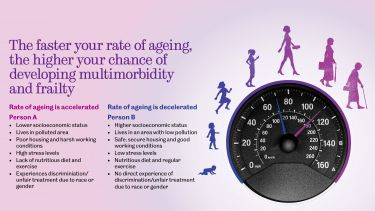Ageing explained
From the moment we are conceived there are factors that influence how we age. These include the social and economic environments we live and work in, as well as our individual biology and behaviour.

Our rate of ageing predicts our health span, i.e. the number of years we can expect to live an independent, healthy life. The slower our rate of ageing, the more resilient we are to multimorbidity, the presence of two or more chronic health conditions, which leads to frailty, and low quality of life in later years.
Our rate of ageing is variable and malleable
Two people with the same date of birth will age at different rates because of the life experiences they have. There are many factors that influence healthy ageing, such as:
- Socioeconomic status
- Ethnicity
- Environment (physical, social and commercial)
- Lifestyle
- Diet
- Access to healthcare
- Working conditions
- Social networks
- Discrimination
- Hereditary illness
- Birth weight
- Growth and development
It helps to think of ageing as a risk factor for disease, much like smoking is a risk factor for cancer. The more you have aged, the more likely you are to develop age related diseases such as dementia, heart disease, Parkinson's and COPD. By slowing down your rate of ageing you can delay or even prevent the onset of age related disease and frailty.
In the UK, more than three-fifths of those aged 65 and over have multimorbidity. When this happens quality of life can be severely impacted. Typically diseases are treated individually, with doctors prescribing medication for each condition but this can cause adverse side affects when the different drugs mix and interact. Therefore, we not only need to find ways to slow down our ageing, but we also need to find ways to better treat patients with multimorbidity.
At the Healthy Lifespan Institute we are:
- investigating how to slow down cellular ageing and helping our bodies repair their DNA
- developing drugs that treat multiple age related conditions
- unravelling how our lifestyles and diets are linked to health and suggesting practical ways that we can all make positive lifestyle changes
- working with central and local government to design and implement public policies that benefit people throughout their lives and reduce the gap between the richest and poorest in society

